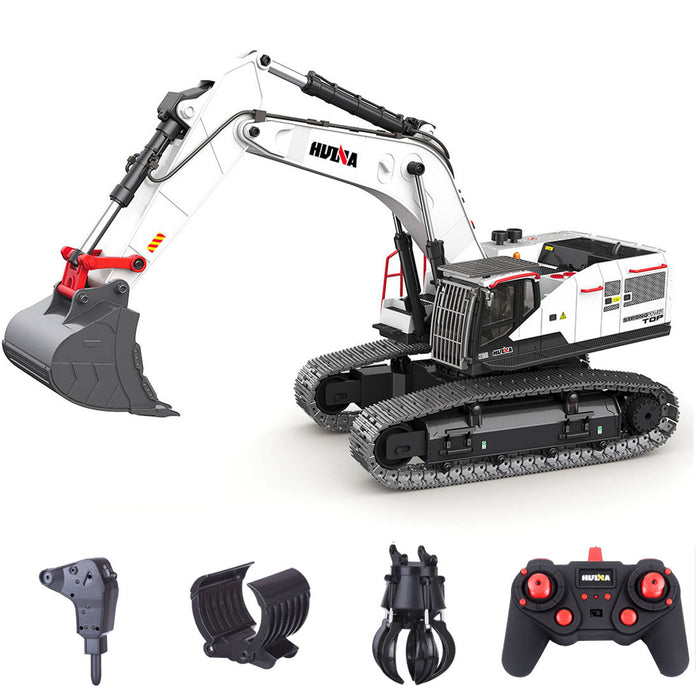Complete Guide to Operating a rc excavator Like a Pro
Wiki Article
Comprehending How Excavator Functions and Its Effect on Performance
Excavators play a crucial function in construction and mining procedures, relying upon an intricate interaction of mechanical and hydraulic systems. Their capability to perform a range of jobs rests on both their layout and the technology incorporated within. Recognizing these parts can considerably impact operational performance and productivity. As advancements continue to improve the sector, one should take into consideration how these modifications will certainly influence future practices and performance.The Essentials of Excavator Mechanics

The Function of Hydraulic Equipments in Excavators
At the heart of excavator operation exists the hydraulic system, which plays an essential role in powering the device's features and motions. This system uses pressurized hydraulic fluid to transfer energy, enabling various actions such as lifting, digging, and swinging. By utilizing the principles of hydraulics, excavators can carry out tasks with remarkable precision and force, boosting total functional efficiency.The hydraulic system contains crucial elements, including pumps, cylinders, and shutoffs, which interact to manage the flow and direction of the liquid. When the driver engages the controls, the hydraulic fluid is routed to certain cyndrical tubes, equating the operator's commands right into physical motion. This mechanism enables receptive and smooth actions, which are essential in building and excavation environments. double e volvo rc excavator. The effectiveness of the hydraulic system straight affects the productivity and versatility of the excavator, making it a vital component in contemporary excavation processesTrick Parts of an Excavator
Recognizing the crucial components of an excavator is essential for understanding exactly how this powerful machine runs. An excavator contains a number of significant components, including the undercarriage, house, arm, boom, and bucket. The undercarriage provides stability and mobility, commonly including tracks or wheels to browse various surfaces. Your home consists of the engine and hydraulic systems, permitting the operator to regulate motion and power the equipment. The boom prolongs from your house, allowing upright reach, while the arm connects to the container, facilitating digging and lifting operations.Additionally, the taxicab houses the operator, geared up with controls for specific maneuvering. Each of these elements plays a vital role in the excavator's overall functionality, contributing to its performance and performance on building websites. Understanding these parts assists in preserving and maximizing excavator performance, making certain jobs are completed securely and properly.Add-on Adaptability and Its Benefits
Add-on versatility is an important element of excavators, allowing drivers to switch between various devices tailored for specific tasks. This adaptability not only boosts work performance yet also contributes to cost-effectiveness by reducing the need for multiple machines. Understanding the various sorts of add-ons readily available can significantly affect the general performance and functionality of an excavator on task websites.Types of Accessories
While excavators are mainly recognized for their digging capacities, their real convenience hinges on the vast range of attachments offered. These attachments boost the excavator's performance, allowing it to do numerous tasks past excavation. Usual add-ons consist of pails (for digging and scooping), hydraulic thumbs (for comprehending products), and augers (for drilling openings) Grapples are made use of for managing and relocating particles, while rippers can break up hard surface areas. Other specialized add-ons, such as plates and plows, enable excavators to adjust to specific work needs. This variety not only raises the maker's utility throughout different fields, including demolition, building and construction, and landscaping, yet also permits operators to customize their equipment to satisfy specific job needs effectively.Raised Job Effectiveness
Making the most of work efficiency is a main benefit of utilizing different excavator add-ons. Different accessories permit an excavator to perform several jobs without needing to change tools, conserving important time and labor. Utilizing a hydraulic hammer can damage concrete while a pail add-on can excavate soil, allowing a smooth operations. This versatility decreases downtime connected with tools adjustments and enhances efficiency on-site. Furthermore, specialized add-ons boost accuracy in jobs such as grading or landscape design, leading to higher quality results. The capability to adapt to different task demands not only enhances procedures however likewise reduces the need for added equipment, making certain that tasks are finished promptly and properly. On the whole, add-on convenience significantly adds to boosted task effectiveness in excavation work.Cost-Effectiveness and Flexibility
Cost-effectiveness is a significant advantage of making use of functional excavator accessories. These attachments allow a solitary excavator to do several tasks, reducing the need for additional machinery and labor - double e volvo rc excavator. By switching over in between containers, hammers, and grapples, operators can take on different jobs, from digging to demolition, therefore optimizing devices usage. This flexibility not just lowers functional expenses but additionally lessens downtime related to altering equipment. In addition, the capability to customize excavators with specialized accessories enhances performance, as they can effectively handle varied tasks according to project needs. In conclusion, the mix of cost-effectiveness and flexibility in excavator add-ons adds to boosted operational performance and resource allocation in building and construction and excavation projects
Advanced Technology in Modern Excavators
Modern excavators are increasingly outfitted with sophisticated innovation that changes excavation procedures. Automation improves operations, while boosted fuel efficiency minimizes operational prices. Furthermore, clever control systems enhance precision and security, marking a significant evolution in excavation tools.Automation in Excavation Processes
As excavation innovation evolves, automation has actually emerged as a critical element in enhancing performance and precision on task websites. Modern excavators are geared up with innovative automated systems that assist in rc excavator jobs such as grading, digging, and trenching with marginal operator treatment. These systems utilize sensing units, GPS, and equipment knowing formulas to guarantee exact positioning and depth control, substantially decreasing the margin for mistake. Additionally, automation permits operators to concentrate on tactical decision-making instead of manual controls, resulting in boosted productivity generally. Such innovations not only enhance workflows yet also improve safety and security by minimizing human error in complicated procedures. Consequently, the integration of automation in excavation processes stands for a substantial improvement in construction innovation, driving the market in the direction of better efficiency and efficiency.Improved Gas Performance
Innovations in modern technology have likewise resulted in considerable enhancements in fuel effectiveness for contemporary excavators. Modern devices are furnished with sophisticated engines that enhance power outcome while lowering gas intake. These engines use ingenious combustion innovations, such as turbocharging and direct fuel shot, to boost efficiency and effectiveness. In addition, light-weight materials in construction reduce total weight, permitting much less energy expenditure throughout procedure. The introduction of variable rate controls allows operators to readjust engine performance according to details jobs, even more reducing fuel usage. As an outcome, these enhancements not only reduced operational costs yet likewise contribute to environmental sustainability by lowering discharges. On the whole, boosted fuel efficiency in excavators is an essential growth that reinforces productivity and financial practicality in the construction sector.Smart Control Systems
While drivers browse progressively complex work sites, clever control systems in excavators have arised as vital tools for improving efficiency and accuracy. These innovative technologies use sensing units and formulas to keep track of numerous parameters such as lots weight, surface conditions, and operational efficiency. By automatically changing hydraulic functions, wise systems maximize device efficiency, resulting in boosted efficiency and minimized endure components. In addition, drivers gain from user-friendly user interfaces that supply real-time responses and diagnostics, enabling informed decision-making. This integration of modern technology not just streamlines operations yet likewise decreases human error, adding to more secure job environments. As the building sector proceeds to evolve, wise control systems will certainly play an essential role fit the future of excavator effectiveness and performance.Enhancing Functional Performance With Excavators
Excavators play a vital function in boosting functional performance throughout various construction and excavation projects. Their convenience permits multiple tasks, including digging, lifting, and material handling, which streamlines process and minimizes the requirement for extra devices. With powerful hydraulic systems, excavators can carry out heavy-duty tasks with accuracy, substantially lowering the moment called for to total jobs. The integration of advanced technology, such as general practitioner and automated controls, better maximizes their procedure, allowing operators to attain better precision and lower product waste. Furthermore, modern-day excavators are created to eat much less fuel and minimize exhausts, adding to both expense savings and ecological sustainability. By using excavators efficiently, construction groups can improve productivity, fulfill job deadlines, and boost general site management. This multifunctionality and performance make excavators vital tools in the modern-day building landscape.The Future of Excavators in Construction and Mining Industries
As the building and construction and mining markets evolve, the future of excavators is poised for substantial change driven by technical development and changing operational needs. Advancements in automation and expert system are improving excavator abilities, permitting for enhanced accuracy and efficiency in procedures. Autonomous excavators are emerging, lowering the need for human treatment and minimizing the danger of accidents.Moreover, the assimilation of telematics and IoT technology allows real-time surveillance of device efficiency and anticipating maintenance, enhancing uptime. Eco-friendly styles, consisting of hybrid and electric designs, are obtaining grip, aligning with sustainability goals within the industry.Additionally, using advanced materials and lighter styles boosts gas efficiency while preserving efficiency criteria. As these fads development, excavators will certainly play a vital role in satisfying the boosting needs for performance and safety in construction and mining, eventually transforming functional landscapes.Often Asked Questions
How Do Weather Conditions Affect Excavator Efficiency?

Climate condition greatly affect excavator efficiency, as rain and mud can hinder grip and stability, while extreme temperature levels might impact hydraulic systems. Operators must adjust to these variables to assure suitable performance and safety and security during operations.
What Safety Measures Should Operators Adhere To While Utilizing Excavators?
Precaution for excavator drivers include putting on suitable personal safety tools, performing pre-operation evaluations, ensuring correct communication with ground employees, preserving a secure distance from overhanging dangers, and adhering to well-known operational methods to stop accidents.Exactly How Frequently Should Excavators Be Kept for Optimal Efficiency?
Excavators should be preserved routinely to assure peak performance, usually every 250 operating hours or as defined by the producer. Regular checks enhance dependability, protect against unexpected malfunctions, and expand the lifespan of the devices.
What Is the Ordinary Lifespan of an Excavator?
The typical life expectancy of an excavator typically ranges from 10,000 to 15,000 hours of procedure. Variables influencing durability include upkeep techniques, operating conditions, and the high quality of the maker itself, influencing overall efficiency and effectiveness.
Can Excavators Operate Uneven Surface Efficiently?
Excavators can run effectively on unequal surface because of their expressed designs and flexible tracks. These attributes allow them to maintain security and grip, allowing efficient procedure in challenging settings commonly come across in building and construction and landscaping jobs. Each of these parts plays an important function in the excavator's general capability, contributing to its effectiveness and efficiency on building and construction websites. Making the most of task effectiveness is a key benefit of utilizing various excavator accessories. While operators browse significantly intricate job sites, smart control systems in excavators have emerged as vital devices for boosting performance and accuracy. Excavators play an essential role in enhancing operational effectiveness across different building and excavation jobs. Developments in automation and man-made knowledge are improving excavator capacities, allowing for enhanced precision and efficiency in procedures.Report this wiki page